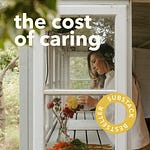At first it was about sharing. You know, “This is happening to me,” “Oh, that happens to me too. That's so hard isn't it?” Over time, though, it became this way of trying to understand what was happening and… it was really about surviving. Writing was how I survived the situation that I was in. it was taking it and making it into something else.
Hi friends,
I’m so excited that the first episode of this new season of The Cost of Caring features my conversation with
who writes Dementia’s Daughter here on .In these conversations, we discuss the intersection of caring and creativity. The way our caring responsibilities feed or starve our work, and how we tend to ourselves in amongst the demands of often chaotic and unpredictable lives. If you’re looking for others in the series, including
, , , and then head on over here.I connected with Sasha a few months ago on here and on Instagram where, for some time, she had been anonymously documenting her experience as a carer for her parents who both – in quick succession – developed forms of dementia. Each diagnosis and rapid decline occurred in tandem with one of her pregnancies and so Sasha found herself bringing her babies into the world while simultaneously supporting one of her parents as they deteriorated. No one wants to consider facing these two seismic life stages at the same time.
With a little bit of distance we talked about how Sasha found solace, community and expression by using her Instagram account in the depths of those hard years, and how her plans for her Substack publication and the community she is nurturing here will unfold. I can’t wait for you to watch or listen, and please meet us in the comments if what we discuss chimes with you.
If you’d like to chat about your experience of caring and creativity, then here’s the Google form you need:
And here are some of the resources we discuss and that Sasha recommends:
https://beaconchc.co.uk/ - free advice on making applications for Continuing Health Care funding, or challenging funding decisions
Alzheimer’s Society provides information and resources for all types of dementia. Their helpline is 0333 150 3456 https://www.alzheimers.org.uk/
https://www.dementiauk.org/information-and-support/how-we-can-support-you/admiral-nurse-dementia-helpline/ - Admiral Nurse Dementia Helpline - speak to specialist dementia nurses for advice and support
https://www.carehome.co.uk/ - User reviews of care homes, residential homes and nursing homes
https://www.carerightsuk.org/ - important charity campaigning for the rights of care home residents and their families.
https://compassionindying.org.uk/ - free help and advice on creating living wills and making choices around dying
https://johnscampaign.org.uk/ - John’s Campaign fights for the right to stay with people with dementia and for the right of people with dementia to be supported by their family carers
https://www.alzheimersresearchuk.org/ - latest news on dementia research and information on maintaining brain health Finally, it’s worth contacting your loved one’s local hospice as they can provide support and information, not just at ‘end of life’ stage. Hospices in the UK often offer an incredible range of services from bereavement counselling to dementia-friendly drop in sessions https://www.hospiceuk.org/hospice-care-finder
I’ll be back on Wednesday with the next episode of my memoir, Held in Mind. The story is steeped in the challenges of caring for parents and children in tandem and if you’re catching up, head to this post:
Held in Mind: a Memoir
“This is stunning. Memoir is such a fascinating genre isn’t it? And you write it brilliantly.”
Lindsay and Sasha x




















Share this post